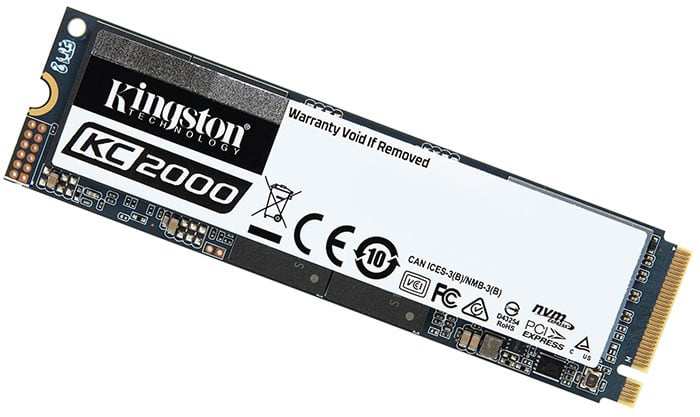Kingston's New KC2000 NVMe SSDs Bring Blistering Speed And Security To Gaming And Work PCs

An interesting thing is happening in the solid state drive (SSD) industry. We are in the midst of a transition from SATA to speedier NVMe SSDs, the latter of which are more costly. At the same time, NAND flash memory prices continues to fall, pushing down the costs of SSDs. So, it's interesting whenever a company announces a new NVMe SSD line, and the first thing we look at is the price. Case in point, Kingston today introduced a new KC2000 family of NVMe SSDs starting at around $62.
We'll circle back to pricing in a moment, but first let's talk a bit about the new drive series. Kingston's latest SSD family pairs 96-layer 3D TLC (triple-level cell) NAND flash memory built by Toshiba and SanDisk with a Silicon Motion SM2262EN controller. More often not, the Phison E12 controller has been paired with the same chips on other SSDs, but Kingston opted to go in a different direction.
"KC2000 is designed for high-performance client usage especially intensive workloads on PCs and workstations that demand speed and reliability," said Justin Karasek, SSD business manager, Kingston. "The drive provides greater flexibility, is available in multiple capacities up to 2TB and its M.2 form factor saves space. KC2000 is the perfect SSD for users looking for the ultimate storage upgrade."
In other words, this drive series is built for both work and play. In terms of the former, it offers certain security advantages—these are self-encrypting SSDs that support end-to-end data protection using 256-bit AES hardware-based encryption.
As for performance, it varies by model, but all of available capacities (250GB to 2TB) are much faster than any SATA-based SSD on the market. Here's a look at the sequential read and write speeds...
- 250GB: up to 3,000MB/s read / 1,100MB/s write
- 500GB: up to 3,000MB/s read / 2,000MB/s write
- 1TB: up to 3,200MB/s read / 2,200MB/s write
- 2TB: up to 3,200MB/s read / 2,200MB/s write
Random 4K read and write IOPS are impressive as well. Here's a look...
- 250GB: up to 350,000 read IOPS / 200,000 write IOPS
- 500GB: up to 350,000 read IOPS /250,000 write IOPS
- 1TB: up to 350,000 read IOPS / 275,000 write IOPS
- 2TB: up to 250,000 read IOPS / 250,000 write IOPS
There are faster NVMe drives on the market, though for the average consumer, these speeds are above and beyond what is needed. As for endurance, Kingston rates it at about 0.3 drive writes per day, or more specifically, 150 TBW (terabytes written) for the 250GB model, 300 TBW for the 500GB model, 600 TBW for the 1TB model, and 1.2 PBW (petabytes written) for the 2TB model.
Coming back to price, all four capacities are available direct from Kingston at the following MSRPs:
- 250GB: $62.40 (~$0.25 per gigabyte)
- 500GB: $114.40 (~$0.23 per gigabyte)
- 1TB: $201.50 (~$0.20 per gigabyte)
- 2TB: $410.80 (~$0.20 per gigabyte)
Those prices are competitive with Samsung's higher performing 970 Evo Plus SSDs, though nearly double of something like Intel's not-as-fast (but still snappy) SSD 660p line and other similar drives. As such, it's probably a more compelling for businesses than it is for consumers, though Kingston is marketing the new drive series at both segments.
The new KC2000 SSDs are available now.

